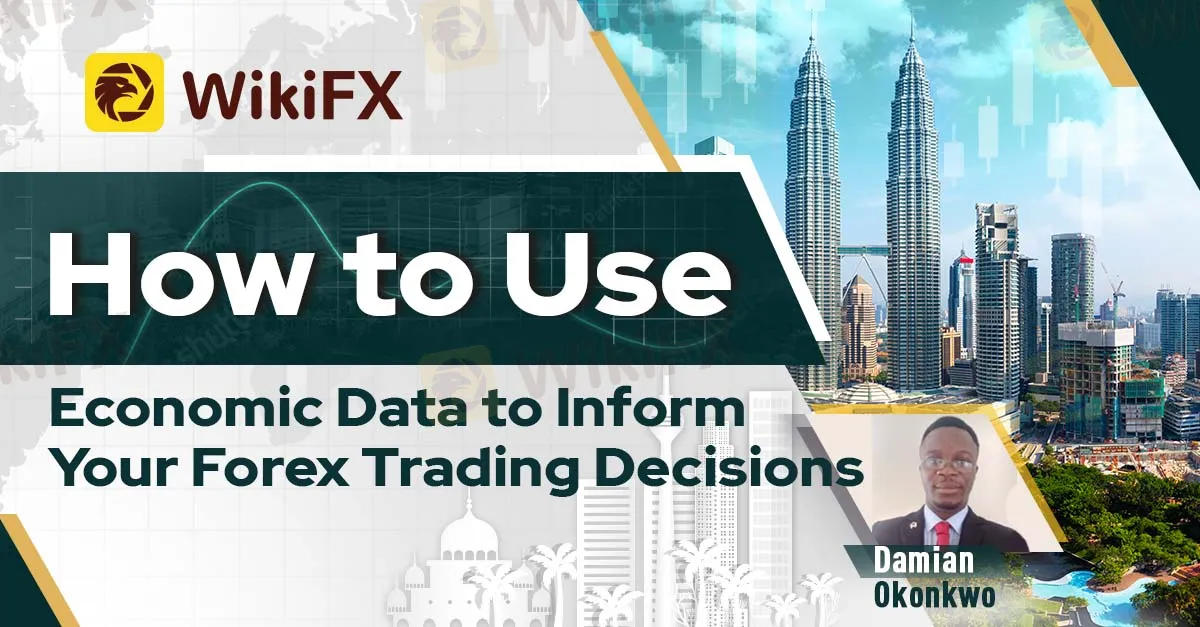简体中文
繁體中文
English
Pусский
日本語
ภาษาไทย
Tiếng Việt
Bahasa Indonesia
Español
हिन्दी
Filippiiniläinen
Français
Deutsch
Português
Türkçe
한국어
العربية
How to Use Economic Data to Inform Your Forex Trading Decisions
Abstract:While technical analysis can provide valuable insights, it's crucial to consider the broader economic landscape and consider the economic data to make informed trading decisions.

By: Damian Okonkwo

How to Use Economic Data to Inform Your Forex Trading Decisions
In the fast-paced world of forex trading, each decision made by a trader matters so much to his positions. While technical analysis can provide valuable insights, it's crucial to consider the broader economic landscape and consider the economic data to make informed trading decisions.
Economic data encompasses a wide range of indicators, such as:
● Gross Domestic Product (GDP): Reflects the overall health of an economy.
● Interest rates: Set by central banks and influence currency valuations.
● Inflation: Measures the rate at which prices increase.
● Trade balance: This gives the disparity between a country's exports and imports statistics.
● Unemployment rate: Indicates the level of economic activity.
● Consumer confidence: Shows how optimistic consumers are about the economy.
Understanding how these indicators interact and impact different currencies is essential for successful forex trading.
Using Economic Data to Make Informed Decisions
Here's how you can use economic data to make informed trading decisions:
1. Identify key economic events:
Economic calendars are essential tools for forex traders. They provide a comprehensive overview of upcoming economic events, along with their potential impact on specific currencies. By focusing on high-impact events, such as:
● Central bank interest rate decisions: Impacting currency valuations.
● Non-farm payrolls: Providing insights into the health of the U.S. economy.
● Retail sales: Reflecting consumer spending and economic activity.
● Manufacturing indexes: Indicating the strength of a country's manufacturing sector.
● Trade balance: Influencing currency valuations based on exports and imports.
2. Analyze the data:
It's crucial to not only identify key economic events but also interpret their implications. Compare the released data to forecasts and historical data to assess the surprise factor and potential impact on the market.
For example, if a central bank raises interest rates more than expected, it could strengthen that country's currency relative to others. Conversely, a weaker-than-expected GDP report could indicate a slowing economy and potentially weaken the associated currency.
3. Align your trading strategy:
Based on your analysis of the economic data, you can adjust your trading strategy accordingly. This could involve:
● Entering long positions if you anticipate a currency strengthening.
● Entering short positions if you anticipate a currency weakening.
● Exiting existing positions if the data suggests a change in market sentiment.
● Hedging your portfolio to protect against potential losses.
4. Manage risk effectively:
Economic data can be unpredictable, so it's crucial to manage risk effectively. This includes:
● Setting stop-loss ordersto limit potential losses.
● Using position sizing to avoid overexposure to any single currency.
● Diversifying your portfolio to spread risk across different currencies and asset classes.
Conclusion
By effectively using economic data, forex traders can gain valuable insights into market movements and make informed trading decisions, ultimately increasing their chances of success in the competitive world of forex trading.

Disclaimer:
The views in this article only represent the author's personal views, and do not constitute investment advice on this platform. This platform does not guarantee the accuracy, completeness and timeliness of the information in the article, and will not be liable for any loss caused by the use of or reliance on the information in the article.
Read more

Forex Hedging: Is It a Trader’s Safety Net or Just an Illusion?
In the volatile world of forex trading, risk is inevitable. One widely used strategy is forex hedging, which is a useful technique designed not to eliminate risk entirely, but to reduce its potential impact. As global economic uncertainty persists, understanding how hedging works could be an essential addition to a trader’s toolkit.

OctaFX Back in News: ED Attaches Assets Worth INR 134 Cr in Forex Scam Case
The Enforcement Directorate (ED) in Mumbai has attached assets worth around INR 131.45 crore. This included a luxury yacht and residential properties in Spain. Read this interesting story.

Is forex trading profitable?
Many traders think that forex trading can make quick profits, but the truth is more complex. While some people do make money in the forex market, others fall prey to its many pitfalls because, in this industry, the scams and misleading promises are widespread.

Admiral Markets: A Mix of Regulation and Risk
Despite multiple licenses, Admiral Markets presents potential red flags that traders should not ignore, including a suspicious clone alert and disclosure by Malaysia’s Securities Commission.
WikiFX Broker
Latest News
Global Brokers Vs. Indian Rules: Why They Struggle in India
Services Surveys Signal 'Expansion' In June, Inflation Fears Remain High
ASIC cancels AFS licences of Ipraxis and Downunder Insurance Services
CFD Brokers Face Dual Compliance Pressures Ahead of 2026: Australia and EU Tighten Rules
FxPro to Launch Crypto Trading Desk, Deepening Digital Asset Push
CFI Financial Group Becomes Official Online Trading Partner of Etihad Arena
Discover 5 Benefits of Trading with Trive FX Broker
Major Risks Associated with AuxiliumFX: You Need to Know
IPO market gets boost from Circle's 500% surge, sparking optimism that drought may be ending
Asia-Pacific markets trade mixed ahead of Trump's deadline for higher tariffs
Currency Calculator


